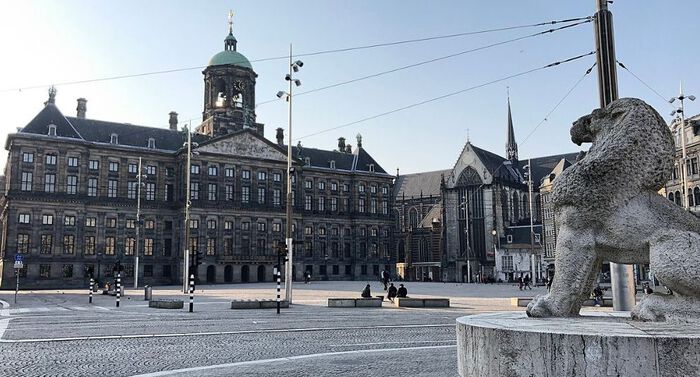How do former right-wing extremists think violent extremism should be combated? In a recent study, Ryan Scrivens, Vivek Venkatesh, Maxime Bérubé, and Tiana Gaudette found that formers believed preventing and countering violent extremism requires a multi-dimensional response, largely consisting of support from parents and families, teachers and educators, law enforcement officials, and other credible formers.
RightNow! - Page 4
Far right actors often rely heavily on traditional narratives about gender and family, whilst simultaneously weaponizing women’s rights and gender equality in pursuit of an anti-immigration and anti-Islam political agenda. In a recently published article, Katrine Fangen and Lisanne Lichtenberg explore this tension within the rhetoric of various German far right organizations.
Naoto Higuchi discusses the evolution of the Japanese far right in the 20th and 21st century, from prewar fascist organizations, to online nativist groups. Although membership of far-right organizations has declined, Higuchi argues that the mainstreaming of the far right has significantly shaped the Japanese political landscape over the last few decades.
The growing popularity of the Nye Borgerlige party (official English name: ‘New Right’, literal translation: ‘New Bourgeois’) and the decline of the Danish People’s Party (DF), indicate that Danish far right politics have taken a neoliberal turn. Anita Nissen and Birte Siim discuss this recent development, and explain how Nye Borgerlige has managed to rapidly gain the support of predominantly male, middle class voters.
In recent years, far-right alternative media have increasingly managed to influence the digital public sphere by promoting uncivil and exclusionary ideas, in particular about immigration and Islam. A recently published study by C-REX affiliates Birgitte P. Haanshuus and Karoline Andrea Ihlebæk explores how an extreme far-right alternative media site uses content from professional media to construct and convey uncivil news with an antisemitic message.
The Dutch parliamentary elections took place last week, after a tumultuous period of anti-lockdown protests, and the fall of the Dutch government in January, over a welfare fraud scandal rife with ethnic profiling. RightNow! Editor Iris Beau Segers interviews Professor Cas Mudde about the most striking outcomes of the election, and what this might mean for the radical right and the state of liberal democracy in the Netherlands.
French academia is currently under scrutiny after the Minister of Research and Higher Education validated the theory of a growing “Islamo-leftism” within social science research. Studies on race and gender have become contentious, and met in the public debate with accusations of fostering identity politics. Recently, a group of academics tried to delegitimize the work of Nonna Mayer, a respected scholar in the field of far right politics.
Ariel Goldstein explains how Brazilian president Jair Bolsonaro, the charismatic ‘Lula of the right’ came to power, in the context of a historical third wave of Latin American far right politics. Bolsonaro capitalized on an interlocked crisis in Brazil, and built his government on a coalition of evangelical pastors, the military, financial markets and the agribusiness sector.
Over the last few weeks, the Dutch radical right has used curfew controversy to portray the government as a danger to the freedom of the average citizen. C-REX scholar Iris Beau Segers asks if the liberal-conservative VVD party might have themselves to blame, and argues that their ‘doctrine of normalcy’ has mainstreamed radical right ideas that now pose a challenge to the government’s covid-19 measures.
From fascistic rallies in the 20s, to the recent storming of the US Capitol: far right demonstrations are complex events, with large societal and political implications. German sociologist Fabian Virchow highlights the importance of analyzing how many people attend such demonstrations, and how they interact with their environment, in order to reach a more complex understanding of far right protest in their historical context.
Taken together, the emerging groups of the Georgian far right obtained less than 5% in the October 2020 elections to the national Parliament. But limited electoral success does not mean that the far-right has limited political power, in Georgia and elsewhere in the world.
As seen on January 6th, 2021, once disparate tendencies within the radical right are mixing and collaborating as never before. The very core technological features of the internet and world wide web have played a crucial role in this process of integration.
With the siege on the U.S. Capitol Building, right-wing extremists with disparate agendas and goals seized a political opportunity to move into violent action and accelerate social chaos. While there are still many unknowns, six questions are likely to be key to what will happen in the U.S. in the near future.
The January 6 attack on the US Capitol was not unexpected. It was anticipated by numerous warning signs, and it built upon a years-long process of radicalisation that involves, but is not limited to, Trump supporters.
Policies to prevent radicalization and violent extremism frequently target militant Islamists, right-wing and left-wing extremists. In a recent study we have examined what distinguishes the ways in which local practitioners perceive and respond to each of the milieus. Our results show that there is a clear discrepancy between the uniform way violent extremism is presented in policy, and how front line practitioners experience the different forms of extremism at the local level.
White women have long been part of white supremacist movements in the U.S. and elsewhere. That continues today. But what place do they occupy in deeply misogynist movements that force white women into idealized categories of white mother, sexual partner, or racial fighter?
Discussions on the fourth wave of far-right politics, referring to its mainstreaming and normalization, can not ignore the role of social media platforms in current-day politics.
This week the Dutch Forum for Democracy (FvD) experienced yet another scandal, but this time the infighting did not favor Thierry Baudet. And so, four years after founding the party, and less than half a year before the next Dutch parliamentary election, Baudet has resigned as party leader, and withdrawn from the top spot on the electoral list, and we can all refocus our attention on the real leader of the Dutch far right, Geert Wilders.
As the volume of research on terrorism and far-right extremism (FRE) grows, so too does a corresponding recognition for a need to pay greater attention to research methodology, especially as this applies to participant interviews.
While the Golden Dawn verdict is a positive step for Greek democracy, it is still important to understand why circa 500,000 Greek citizens voted this criminal organization in the parliament, despite the fact that its violence was well known. The Golden Dawn is an openly neo-Nazi party and its rise in Greek politics should be understood not just as the product of Greece’s economic malaise, but rather of the culmination of the economic crisis into an overall crisis of democracy and political representation.
The Supreme Court of Finland issued a ban on the neo-Nazi Nordic Resistance Movement in the September of 2020. The historical decision follows a case that has been ongoing for several years and has already seen the Finnish right-wing extremist scene change in different ways.
Suicide attacks are virtually absent in far-right terrorism. A recent study of the subcultural, strategic, and historic references to martyrdom, self-sacrifice, and suicide in the contemporary far right shows the potential reasons for this, highlighting the peculiar political mythology of “martyrdom” that characterizes this extremist environment.
Focusing on fixed categories of far-right membership both obscures an important source of information about the far right and mistakenly identifies youth as having static identifications with political and ideological scenes.
What are the consequences of being labeled as a “violent extremist”? How does labeling affect individual activists, their organizations, and the social movement they are part of? In a recent study, we show that labeling – and the associated stigma – affects different radical groups in different ways and that it sometimes fails to demobilize the primary targets of the repressive actions, that is, the most militant groups. Rather, the effects are most evident amongst organizations that mobilize inclusively and openly, using primarily conventional protest tactics. From this we highlight the potential “backfire effects” of labelling, as the most militant groups might be further radicalized by this form of soft repression.
Efforts to implement “Muslim bans” and “extreme vetting” as a way to prevent Jihadism are rooted in a fundamental misconception: that Muslim immigrants bring violence and that Islam is more prone to violence than other religions. Our study shows that Jihadism is not like an exotic virus that one can “keep out”. Rather, it is like a cancer: it can appear anywhere in the world, and it is more likely under certain environmental circumstances, notably relative deprivation. Policy makers may therefore find it more effective to reduce the threat of Jihadism by reducing the stigmatization of Muslims living in the West, rather than banning Muslim migrants.

RightNow!
Welcome to the “RightNow!” blog where you will find commentary, analysis and reflection by C-REX’s researchers and affiliates on topics related to contemporary far right politics, including party politics, subcultural trends, militancy, violence, and terrorism.
“RightNow!” also provides a platform for republishing op-eds by our core team of experts (with due acknowledgement of course) which have been published by newspapers and on other blogs in order to further highlight the breadth of our work here at C-REX. The articles give the views of the authors, not the position of the Centre for Research on Extremism.
To submit proposals and comments, contact the RightNow! editor Celestine Salomé Kunkeler.
.jpg)
























